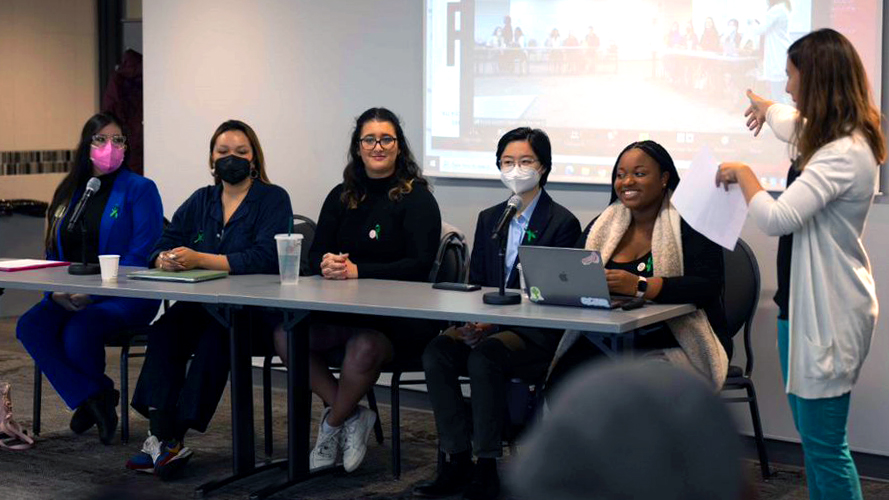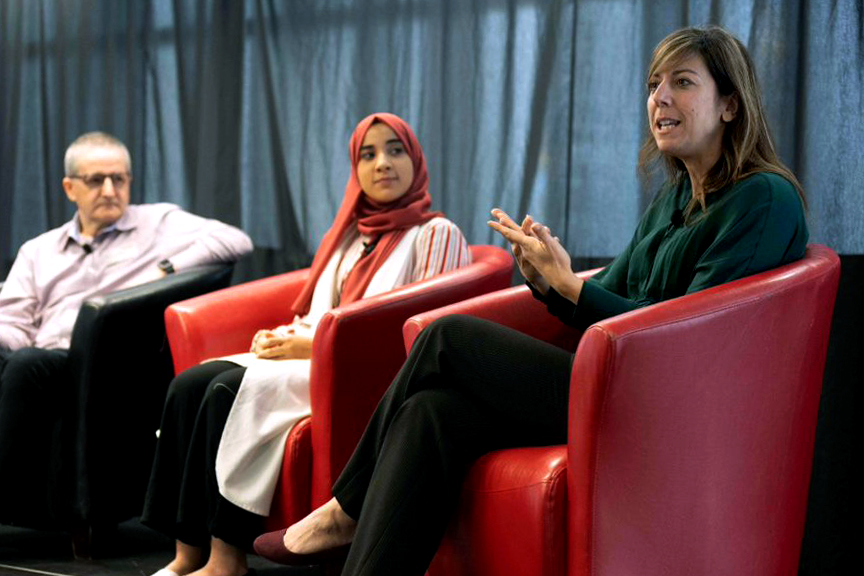Carleton Celebrates Fourth Annual Inclusion Week
Carleton’s fourth annual Inclusion Week took place from October 17 to 20, 2022. Hosted by the Department of Equity and Inclusive Communities (EIC), the week included a series of events centered on this year’s theme of Disrupting Cultures of Inequity: Engaging in brave actions and making meaningful change.
The events included perspectives from community leaders, students, alumni, faculty and staff on equity, diversity and inclusion (EDI) work in diverse fields. The week began with an EIC open house and was followed by a variety of sessions across campus. Another open house with the Engagement and Inclusion Campus Safety Officer capped off the week.
Inclusive Workplace Forum
The Inclusive Workplace Forum was hosted by the Sprott School of Business and Co-operative Education and Career Services at Carleton University, in partnership with the READ Initiative (Research, Education, Accessibility and Design) and ACT to Employ (Accessible Career Transitions).
The Forum included two panel discussions. The first panel covered Social Identity and Inclusion in the Workplace. Their conversations reflected upon the collective responsibility to create a culture of inclusion and equal opportunity in workplaces in allowing everyone to feel comfortable bringing their whole selves to work.
The second panel was entitled Creating a Culture of Access for People Living with Disabilities in the Workplace. The panelists brought emotional discussions about stigma and barriers and reiterated the need for a collective responsibility to create accessibility, not just accommodations.
Jenna Sudds, Member of Parliament (M.P.) for Kanata-Carleton delivered the keynote address before participants got the chance to reflect together and network with the clubs and companies that were in attendance.
Reimaging and rethinking diversity with Tamar Myers
Tuesday saw a full schedule of events, starting with a presentation by Tamar Myers, Director, Research Planning and Assessment, Toronto Metropolitan University (TMU). Myers delivered an insightful talk about the implementation and use of self-identification tools being used at TMU to track EDI metrics and implement positive change based on evidence—though Myers clarified that “data is only an artifact of human experience.”
Myers’ presentation was met with an engaged audience eager to learn about different facets of her work. Topics included ethics and privacy in data collection and presentation, challenges in disaggregating data and using data to infer problems and create positive change.
Student EDI Research Award Presentations
Established last year, the EDI Research Award responds to a specific recommendation in Carleton’s EDI Action Plan and is a landmark recognition for EDI scholarship in Ontario higher education. Following Tamar Myers’ presentation, the six recipients of this year’s Student EDI Research Award presented their research.

Lindsey Alcy spent her summer researching food security in Cap-Haitien. She interviewed 20 women about their relationship with food, particularly regarding their difficulty accessing nutritious food and a hesitancy to trust certain food sources.
Samantha Wong’s project aimed to expand gender representation in engineering. Over the summer, she developed a demonstration and tool to increase interest in physics, especially among girls.
Priya Van Oosterhout studied racial disparities among substance use research participants. She conducted a literature review to analyze consolidated data regarding the presence of racial disparities in substance use research.
Felicity Hauwert studied colonial reverberations and developed methodologies to work with the land. Hauwert collected footage from nature using their intuition to create a healing experience using sound.
Carolyn Simon explored ways to decolonize and Indigenize education in the School of Social Work. They conducted a literature review and explored methodologies to Indigenize pedagogy including taking narrative approaches to teaching.
Maryam Sahar examined biases in Canada’s response to refugees from Afghanistan and Ukraine—both suffering major humanitarian crises.
The six research students expressed their appreciation toward their mentors, supporters, EIC and the Office of the Provost and Vice-President (Academic). Most of them plan to continue their research, obtaining grants from other initiatives and continuing to make an impact in their research areas.
RIFA Roundtable
The Racialized and Indigenous Faculty Alliance (RIFA) presented an online roundtable about alternative grading as an anticolonial and anti-racist praxis. Carleton faculty had the chance to share their methods for alternative grading and reflect on the importance and utility of diverse grading methods.
The discussions during the roundtable included the benefits of alternative grading methods like encouraging student self-reflection, reducing a need for arbitrary grading measures and being more inclusive for all students.
Building Inclusive Excellence in Science
On Wednesday, the Faculty of Science held a panel discussion about the many ways they recognize opportunities to bring more diverse conversations and representation to science disciplines and academia. Discussions included outreach and retention methods for equity groups in science, the importance of allyship and an urge for everyone to have a willingness to learn from each other’s lived experiences. “It’s a shared responsibility to make science a place for everybody,” said Rowan Thomson, Associate Dean (EDI). “Science will be a better place if everyone is involved.”

Wrapping up
Inclusion Week concluded with a Campus Safety Services (CSS) open house to meet Jaymie Baldree, CSS’ new Engagement and Inclusion Officer (EIO). The EIO program aims to help CSS engage and interact with the Carleton community while also building mutual respect and trust between community members and CSS staff.
Carleton’s fourth annual Inclusion Week attracted over a hundred participants, a great turnout for the first in-person set of events in two years. The discussions sparked from the events were valuable in advancing EDI-related awareness, action and response to priorities outlined in Carleton’s EDI Action Plan.